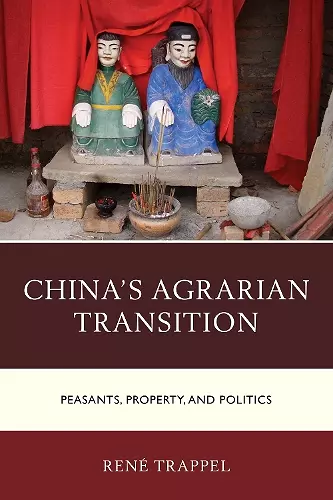China's Agrarian Transition
Peasants, Property, and Politics
Format:Hardback
Publisher:Lexington Books
Published:18th Dec '15
Currently unavailable, and unfortunately no date known when it will be back

This book provides an in-depth analysis of the transformation occurring in Chinese agriculture, highlighting the shift from smallholder farming to large commercial enterprises.
This empirical case study examines the ongoing transformation of agriculture in China, focusing on the roles of property institutions, peasant differentiation, and rural politics in shaping a market for agricultural land. This transformation is a vital part of the shift from smallholder farming to larger commercial enterprises. The political changes initiated over thirty years ago, which dismantled agricultural collectives and granted exclusive rights to small plots of farmland for rural families, marked a significant return to smallholding in the People's Republic of China.
Today, however, the landscape of Chinese agriculture is undergoing another significant change. In many villages, smallholder farming is increasingly being replaced by large agricultural enterprises. China's Agrarian Transition delves into this latest evolution, highlighting the peasantry's frustrations with current farming conditions, the influence of national and local political priorities, and the adjustments in collective land management since the reintroduction of family-based farming.
The analysis presented in China's Agrarian Transition is grounded in meticulous research conducted through three field trips to Shandong, Sichuan, and Guizhou Provinces between 2008 and 2010. The findings underscore the critical role of institutional path-dependencies and the strategic interventions (or lack thereof) by the government in facilitating economic transformation. This book stands as one of the first comprehensive accounts of the recent agricultural developments in the People's Republic of China, offering valuable insights for political scientists, sociologists, economists, and those interested in the ongoing changes within China's rural landscape.
In China’s Agrarian Transition, René Trappel makes a fine contribution to the scholarly literature examining the direction and purpose of reforms to rural land use in contemporary China.... Well written, strongly argued and based on impressive empirical evidence, this undoubtedly is an excellent addition to the growing body of studies on China’s land regime. It deserves to be read by all scholars and students of rural development and agrarian change in contemporary China. * China Quarterly *
This is a succinct and empathetic analysis of the endless muddling-through of agrarian reforms in China. By placing us in their restrictive yet enabling contexts, Dr. Trappel helps us understand the expectations, frustrations, and hopes of Chinese peasants, rural cadres, government officials, and political leaders. -- Lianjiang Li, University of Hong Kong
China’s agrarian society is in the midst of an historical fundamental change. René Trappel’s volume captures and illuminates the urgent issues of this transition and adopts the specific and understudied point of view of villagers whose lives are being altered. His careful fieldwork provides the basis for a clear understanding of the struggles facing China’s smallholders as they encounter far more powerful actors and economic forces. This volume represents systematic hypothesis testing that applies an historical institutional approach and process tracing animated by extensive first-hand in-depth interviews. His well-supported yet contentious argument contributes tremendously to the debate on how to understand the problems that result from the myriad changes to institutions structuring agrarian and rural life. In short, this volume is a must-read for any China watcher interested in considering the winners and losers of China’s great agrarian transition. -- John A. Donaldson, Singapore Management University
This book offers an exciting new perspective on the forces transforming rural China. Based on a wide range of sources—from interviews to central government documents to rental contracts between rural households and companies—René Trappel convincingly uncovers the many structural factors presently leading to the commodification of farmland without actual privatization. The main argument of the book cuts to the heart of the debate about how we should interpret the recent past, present, and future of Chinese agriculture and rural society. Lucidly written and carefully argued, this book is well suited for undergraduate and graduate courses on rural China. -- Stig Thøgersen, Aarhus University
ISBN: 9780739199367
Dimensions: unknown
Weight: unknown
222 pages